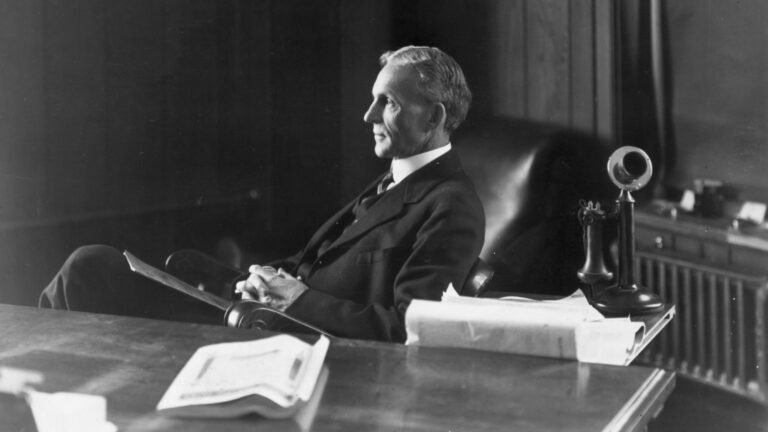Henry Ford, born on July 30, 1863, in Greenfield Township, Michigan, was an American industrialist and founder of the Ford Motor Company. He is best known for developing the assembly line technique of mass production, which transformed manufacturing and made automobiles accessible to the average American. Ford was not just a businessman; his innovations profoundly affected industries, labor practices, and the overall economy of the United States. He believed in efficiency and productivity, which he applied to every aspect of his work, revolutionizing the 20th-century industrial landscape.
Early Life and Career of Henry Ford
Henry Ford was born into a farming family but had little interest in pursuing a career in agriculture. Instead, he was drawn to mechanics and machines. From a young age, Ford was known to tinker with machines and figure out how they worked. At 16, he left home to work as an apprentice machinist in Detroit, laying the foundation for his lifelong passion for engineering and innovation.
The Influence of Early Jobs
Ford’s early experience working for Edison Illuminating Company as an engineer gave him insight into the world of mechanics and how machines could improve productivity. During his time at Edison, Ford worked on building his first gasoline-powered vehicle, the Quadricycle, in 1896. This vehicle laid the groundwork for his future innovations in the automobile industry.
By 1899, Ford had left Edison to co-found the Detroit Automobile Company, which unfortunately failed after two years. Nevertheless, Ford persisted, driven by the belief that automobiles could be manufactured more efficiently and sold at prices the average American could afford.
Founding of Ford Motor Company
In 1903, Henry Ford founded the Ford Motor Company with an initial investment of $28,000 from various investors, including the Dodge brothers, who would later start their own car company. Unlike his previous ventures, Ford Motor Company focused on mass production and affordability, setting Ford apart from competitors like Oldsmobile and Cadillac, who catered to wealthier clientele.
The company’s first significant success came in 1908 with the introduction of the Model T, a car that was simple, reliable, and affordable. Priced initially at $825, Ford continually reduced its cost through efficiency improvements, and by 1925, the Model T sold for just $260.
Revolutionizing Manufacturing: The Assembly Line
Perhaps Ford’s most significant contribution to modern industry was the development of the assembly line in 1913. By adopting this method, Ford was able to dramatically reduce the time it took to assemble a car. Before the assembly line, it took over 12 hours to build a single Model T; after implementing the assembly line, this time was reduced to just 93 minutes.
The assembly line method was so successful that it allowed Ford to produce more than 15 million Model Ts between 1908 and 1927. This efficiency also allowed Ford to lower prices, making cars more accessible to the general public, while simultaneously increasing production.
Impact on Labor and Production
Ford’s implementation of the assembly line had far-reaching consequences, not just for the automotive industry, but for manufacturing in general. By standardizing parts and breaking down complex tasks into simple, repetitive steps, Ford created a system that could be replicated across various industries, from appliances to electronics.
However, the assembly line also led to concerns about the impact on workers. Ford addressed these concerns by introducing the $5 per day wage in 1914, more than doubling the average daily wage at the time. This move not only reduced turnover and attracted skilled workers but also increased productivity. Ford’s idea was that well-paid workers would also become consumers of his products, helping to fuel the economy.
The Model T: The Car That Changed America
The Model T, also known as the “Tin Lizzie”, is often considered the car that put America on wheels. Introduced in 1908, it quickly became a best-seller due to its affordability and reliability. Ford’s ability to lower the cost of production through the assembly line enabled the price of the Model T to drop significantly, allowing more Americans than ever to purchase a car.
By 1927, when production of the Model T ended, over 15 million units had been sold, making it the most successful car in history at that time.
| Year | Price of Model T | Total Units Sold |
| 1908 | $825 | 10,000 |
| 1915 | $490 | 308,162 |
| 1920 | $355 | 941,042 |
| 1925 | $260 | 1,911,705 |
| 1927 | $290 | 15,000,000 |
Social Impact and Philosophy
Henry Ford was not just an industrialist; he had a philosophy that extended beyond business. He was a proponent of “welfare capitalism”, believing that companies had a responsibility to provide their employees with a decent standard of living. His decision to raise wages to $5 per day was a direct result of this belief.
Ford also implemented reduced working hours, cutting the standard workday to eight hours in 1914, and later introducing a five-day workweek in 1926. He believed that workers who were well-paid and had more leisure time would be more productive and, crucially, would spend more, boosting the economy.
Ford’s ideas on labor and production had a lasting impact on American society. His policies helped establish the middle class and transformed the way businesses treated their workers, setting a standard for wages and working conditions across various industries.
Ford’s Global Influence
Henry Ford’s ideas and methods were not confined to the United States. His vision for mass production and affordable cars spread across the globe. Ford factories were set up in Europe, South America, and Asia, making the Ford brand a household name worldwide.
Ford’s international influence was not limited to his products. His innovations in manufacturing and labor practices were adopted by industries worldwide. Countries like Germany and Japan studied and implemented Ford’s production techniques to modernize their own industries.
The Controversies Surrounding Henry Ford
Despite his achievements, Henry Ford was a complex figure with a controversial side. His anti-Semitic views were widely publicized through his newspaper, The Dearborn Independent, which he purchased in 1919. Ford used the publication to spread conspiracy theories about Jewish influence in world affairs, drawing widespread criticism.
Although Ford later apologized for these views in 1927, the damage to his reputation had already been done. His anti-Semitic beliefs remain a dark chapter in his otherwise celebrated career.
Ford’s Later Years and Legacy
Henry Ford officially retired from Ford Motor Company in 1945, handing control over to his grandson, Henry Ford II. Ford passed away two years later on April 7, 1947, at the age of 83.
Ford’s legacy lives on through the Ford Motor Company, which remains one of the largest and most successful car manufacturers in the world. His innovations in mass production, assembly lines, and labor practices have shaped the modern industrial world and changed the course of history.
Ford is often remembered as a visionary who democratized the automobile and laid the groundwork for the development of the modern manufacturing process.
Conclusion
Henry Ford’s contributions to the world extend far beyond the automobile. His innovations in mass production, labor practices, and affordable pricing transformed the industrial landscape of the 20th century. By making cars affordable for the average person, Ford democratized personal transportation and created a ripple effect in industries across the world.
While Ford’s legacy is not without controversy, his influence on manufacturing, the global economy, and the middle class remains undeniable. Today, Henry Ford is remembered as a pioneer who transformed the way we live and work. His innovations in mass production not only revolutionized the automotive industry but also set the foundation for modern manufacturing techniques that have been adopted globally. Ford’s commitment to efficiency, affordability, and productivity continues to influence industries far beyond automobiles, making his impact felt in virtually every sector of the global economy.
His philosophy of making products affordable for the masses while maintaining high standards of production set a precedent for future generations of entrepreneurs. By advocating for better wages and shorter workweeks, Ford also contributed significantly to improving labor conditions in the United States and around the world. The idea that workers should be paid well enough to afford the products they produce was a revolutionary concept at the time, one that helped shape the modern middle class.
Although Ford’s personal beliefs and controversies have left a blemish on his legacy, his contributions to industrial and social progress far outweigh the negative aspects of his life. His vision and determination helped create a new world where cars were no longer a luxury but a necessity. Today, Ford Motor Company continues to be one of the largest automakers in the world, a testament to Henry Ford’s lasting influence on both business and society.
Frequently Asked Questions (FAQs) About Henry Ford
What did Henry Ford invent?
Henry Ford did not invent the automobile but revolutionized its production through the assembly line, making cars affordable for the average person.
What is Henry Ford famous for?
Henry Ford is famous for founding the Ford Motor Company, developing the Model T, and revolutionizing the manufacturing process with the assembly line.
How did Henry Ford change the world?
Ford changed the world by making automobiles affordable, introducing mass production techniques, and advocating for higher wages and shorter workweeks.
When did Henry Ford introduce the assembly line?
Henry Ford introduced the assembly line in 1913, dramatically increasing the efficiency of automobile production.
How much was Henry Ford worth?
At the time of his death in 1947, Henry Ford’s net worth was estimated to be $200 billion in today’s dollars, making him one of the richest men in history.
What is Ford Motor Company?
Ford Motor Company, founded by Henry Ford in 1903, is one of the world’s largest automakers, known for its innovation and mass production techniques.


